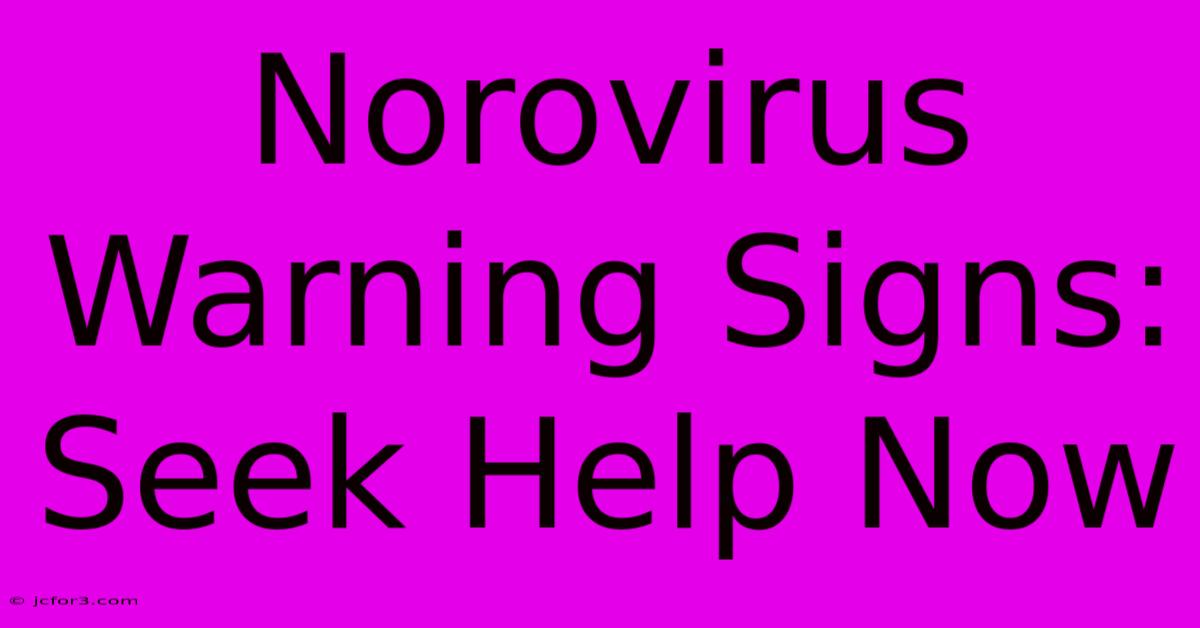Norovirus Warning Signs: Seek Help Now

Discover more detailed and exciting information on our website. Click the link below to start your adventure: Visit Best Website mr.cleine.com. Don't miss out!
Table of Contents
Norovirus Warning Signs: Seek Help Now
Norovirus, commonly known as the "stomach flu," is a highly contagious virus that can cause severe gastrointestinal illness. While most people recover within a couple of days, some individuals may experience more severe symptoms that require medical attention. Knowing the warning signs of norovirus is crucial for seeking timely help and preventing complications.
What are the Symptoms of Norovirus?
The most common symptoms of norovirus include:
- Vomiting
- Diarrhea
- Nausea
- Stomach cramps
- Headache
- Low-grade fever
- Body aches
- Fatigue
These symptoms typically appear 12 to 48 hours after exposure to the virus and can last for one to three days.
Norovirus Warning Signs that Require Medical Attention
While most people recover from norovirus without complications, some individuals may experience more severe symptoms that warrant medical attention. Seek immediate medical help if you experience any of the following:
- Severe dehydration - This is a common complication of norovirus, especially in children and the elderly. Signs of dehydration include:
- Dry mouth
- Decreased urination
- Sunken eyes
- Dizziness
- Rapid heartbeat
- Bloody diarrhea - This could indicate a more serious infection or a complication like colitis.
- High fever - A high fever, especially when accompanied by other symptoms, may signal a secondary bacterial infection.
- Persistent vomiting - If you are unable to keep down fluids for more than 24 hours, dehydration can quickly become a serious concern.
- Confusion or disorientation - These symptoms can be signs of severe dehydration or other complications.
- Severe abdominal pain - Intense abdominal pain that doesn't subside may indicate a more serious medical condition.
What To Do If You Think You Have Norovirus
If you experience norovirus symptoms, the most important thing is to stay hydrated. This means drinking plenty of fluids, such as water, clear broth, and oral rehydration solutions. You can also try eating bland foods, like toast or crackers, once you can tolerate them.
Here are some additional tips for managing norovirus at home:
- Rest: Getting enough rest will help your body fight off the virus.
- Wash your hands frequently: Wash your hands thoroughly with soap and water for at least 20 seconds, especially after using the bathroom, changing diapers, and before eating.
- Clean and disinfect surfaces: Norovirus can survive on surfaces for a long time, so it's important to clean and disinfect all areas that have been touched by someone with norovirus.
- Avoid contact with others: Stay home from work or school and avoid contact with others to prevent spreading the virus.
- Seek medical attention: If your symptoms are severe or you experience any of the warning signs listed above, don't hesitate to seek medical attention.
Preventing Norovirus
The best way to prevent norovirus is to practice good hygiene. Here are some tips:
- Wash your hands frequently: Wash your hands thoroughly with soap and water for at least 20 seconds, especially after using the bathroom, changing diapers, and before eating.
- Clean and disinfect surfaces: Clean and disinfect surfaces that may have come into contact with the virus, such as doorknobs, countertops, and toys.
- Cook food thoroughly: Norovirus can be spread through contaminated food, so make sure to cook food to the recommended internal temperature.
- Avoid contact with sick people: If you are sick with norovirus, stay home from work or school and avoid contact with others to prevent spreading the virus.
Norovirus can be a debilitating illness, but by recognizing the warning signs and seeking medical attention when necessary, you can help prevent complications and promote a faster recovery.

Thank you for visiting our website wich cover about Norovirus Warning Signs: Seek Help Now. We hope the information provided has been useful to you. Feel free to contact us if you have any questions or need further assistance. See you next time and dont miss to bookmark.
Featured Posts
-
Tom Holland Spider Man 4 Filming Starts Next
Oct 24, 2024
-
Why Nicole Kidman Paused Babygirl Scenes
Oct 24, 2024
-
Exfutbolistas De Boca Se Reencuentran En Rosario
Oct 24, 2024
-
Uk Foreign Minister Focuses On Asia Security Ties
Oct 24, 2024
-
Mouse Cut Der Neue Haar Trend 2024
Oct 24, 2024
